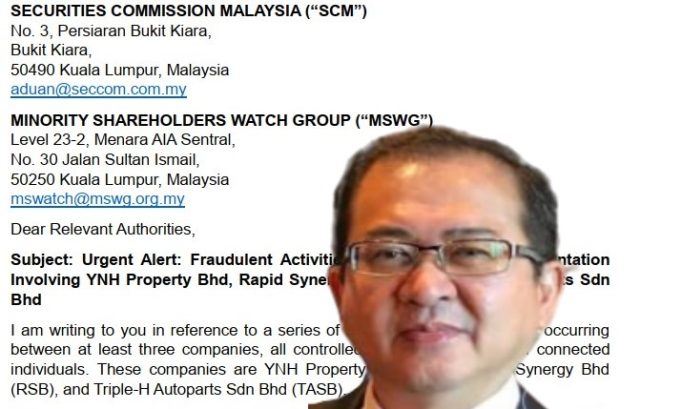Kuala Lumpur, Malaysia – (26 June 2023) – In a shocking revelation, a recent whistleblower report submitted to the Securities Commission Malaysia (SCM) has unveiled a series of fraudulent activities involving three major companies: YNH Property Bhd (KLSE:YNHPROP) (“YNH”), Rapid Synergy Bhd (KLSE:RAPID) (“RSB”), and Triple-H Autoparts Sdn Bhd (“TASB”). All three companies are allegedly controlled by the same group of connected individuals, referred to as the “Yu Syndicate.”
The report alleges that these companies have been involved in dubious activities that systematically utilized assets owned by both YNH and RSB, amounting to over RM 300 million without appropriate disclosures or reporting. This has reportedly resulted in a cost of more than RM 110 million in interest alone to YNH shareholders.
The fraudulent scheme involves artificially inflating the value of assets through trades between entities controlled by the same parties. These inflated assets were then used to secure credit far in excess of the assets’ true values. The funds obtained were then extracted through fictitious Joint Venture agreements with JV deposits for future profits that do not exist.
The report also highlights that these JV deposits are listed as assets on the companies’ balance sheets, despite the fact that the companies receiving these deposits have no assets or businesses capable of repaying these funds. In most cases, the majority of the funds were allegedly gifted, transferred, or otherwise disposed of outside of the entity, leaving it insolvent without any enforceable methods to reclaim the said JV deposits.
The report specifically points out Yew Hock Ming, a cousin of the controlling shareholders/directors Yu Kuan Chon & Yu Kuan Huat, as a key player in this fraudulent scheme. Yew Hock Ming was previously sanctioned by the SCM for stock trading violations of RSB and YNH.
The whistleblower report warns that enforcement and protective actions need to be taken immediately before this entire mess turns into the next financial scandal of Malaysia. The damages to the markets could be dramatic at so many levels that it could potentially cause significant damage to the economy.
The report ends with a call to action, urging the relevant authorities to put a stop to this sort of fraud before the markets face financial ruin. It emphasizes that the rules are not in place to be circumvented, but for the spirit in which they were written, and to protect the market, stakeholders, and investors.
This scandal serves as a stark reminder of the importance of stringent financial oversight and the potential consequences of its absence. It is a call to action for regulators, auditors, and other stakeholders to ensure that such fraudulent activities are identified and stopped in their tracks.















